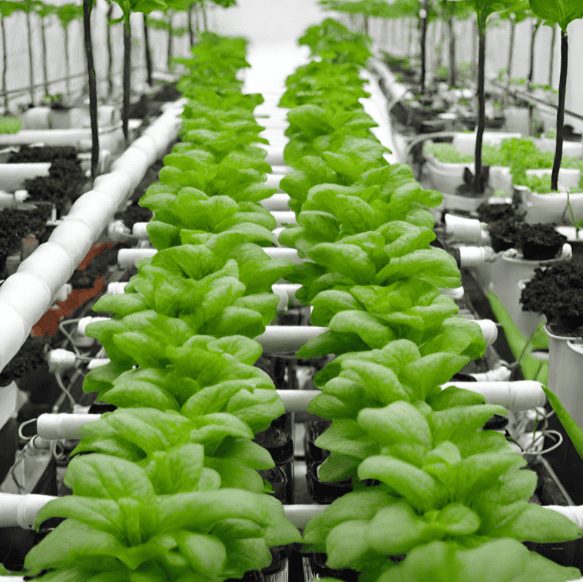
I’ve always been curious about the impact of hydroponics on human health. With so many claims and counterclaims out there, it’s hard to separate fact from fiction. That’s why I delved into the research to bring you an objective analysis of the hydroponics health debate.
In this article, we’ll compare nutrient compositions, scrutinize safety concerns, explore specific health impacts, and ultimately assess whether hydroponics is truly bad for your health.
So let’s dive in and find out the truth behind this controversial topic!
KEY TAKEAWAY
Is Hydroponics Bad for Your Health?
Hydroponics itself is not bad for your health; in fact, it can lead to healthier and pesticide-free produce. However, like any agricultural system, it’s crucial to maintain proper hygiene and water quality to ensure the safety of the plants and the people consuming the crops.
Separating Myth from Science: Hydroponics and Human Health Claims Fact-Checked
Are you curious to know if the claims about hydroponics and human health are actually supported by scientific evidence? Let’s dive into the research and separate myth from fact.
One of the main arguments in favor of hydroponics is its potential health benefits. Proponents claim that hydroponically grown produce has higher nutrient content compared to conventionally grown crops. While it is true that hydroponic systems allow for precise control over nutrient levels, studies comparing the nutrient content between hydroponic and soil-grown produce have yielded mixed results. Some studies have found no significant differences, while others have shown slightly higher nutrient levels in hydroponically grown crops.
Another claim often made is that hydroponic produce is more organic because harmful chemicals like pesticides and herbicides are not used. However, this claim requires closer examination. While it is true that traditional chemical pesticides may be avoided in hydroponics, other methods such as integrated pest management or biocontrols are still employed to manage pests and diseases. Additionally, some hydroponic systems may use synthetic fertilizers or additives, which may raise concerns about their impact on human health.
Nutrient Necessities: Comparing the Composition of Hydroponic vs. Soil-Grown Crops
Comparing the composition of crops grown in hydroponics versus soil reveals differences in nutrient necessities. In the ongoing health debate surrounding hydroponics, understanding the nutritional content of these crops is crucial. Research has shown that there are variations in nutrient levels between hydroponically-grown and soil-grown crops.
Hydroponic systems provide plants with a carefully controlled environment, allowing for optimal growth. However, this controlled environment can affect the nutrient uptake of plants. Some studies have found that hydroponic crops may have higher levels of certain nutrients compared to their soil-grown counterparts. This is due to the precise management of nutrient solutions in hydroponics, ensuring that plants receive exactly what they need.
On the other hand, soil-grown crops rely on the natural composition and fertility of the soil. The nutrient content of these crops can vary depending on factors such as soil type and quality, climate conditions, and farming practices. While some argue that soil-grown crops may contain a wider range of natural minerals and trace elements, others claim that these nutrients may not always be readily available or easily absorbed by humans.
It is important to note that both hydroponically-grown and soil-grown crops can contribute to a healthy diet when properly managed. The choice between these cultivation methods should be based on various factors including environmental impact, resource efficiency, and individual preferences.
Overall, comparing the composition of hydroponic vs. soil-grown crops reveals differences in nutrient necessities. Further research is needed to better understand how these differences impact human health and nutrition.
Safety Scrutinized: An Objective Look at Hydroponic Chemical Concerns
When it comes to scrutinizing the safety of hydroponic systems, you may have some concerns about the chemicals used in the process. The health debate surrounding hydroponics often revolves around the use of synthetic nutrients and potential chemical residues on hydroponic vegetables. However, it is important to approach this topic with objectivity and consider the research available.
Hydroponics, as a farming method, relies on nutrient-rich water solutions to provide plants with essential elements for growth. These nutrient solutions can be composed of both natural and synthetic compounds, tailored specifically to meet plant requirements. While synthetic nutrients are commonly used in hydroponics due to their stability and availability, they undergo rigorous testing to ensure they are safe for human consumption.
Chemical residues on hydroponic vegetables have also been an area of concern. However, studies have shown that pesticide levels on hydroponically grown crops are generally lower compared to conventionally grown ones. This is because hydroponic systems allow for precise control over nutrient delivery and pest management practices.
Mitigating Risks: Best Practice Tips for Safe, Nutritious Hydroponic Production
To ensure safe and nutritious hydroponic production, it’s important to follow best practice tips and adhere to strict regulations. Here are four key tips for mitigating risks and ensuring the safety of your hydroponic system:
- Proper sanitation: Maintaining a clean and sterile environment is crucial for preventing the growth of harmful bacteria or pathogens. Regularly disinfect all equipment, including reservoirs, pumps, and growing containers.
- Water quality management: Monitor the pH levels and nutrient content of your water regularly to ensure optimal conditions for plant growth. Use purified water or treat it with appropriate filters to eliminate any potential contaminants.
- Nutrient balance: Achieving a balanced nutrient solution is essential for providing plants with the necessary vitamins and minerals they need to grow healthily. Follow recommended guidelines for nutrient ratios and adjust accordingly based on plant requirements.
- Pest control: Implement integrated pest management strategies such as biological controls or organic pesticides to prevent infestations without compromising the safety of your crops.
By following these best practices, you can minimize risks associated with hydroponics while maximizing the potential for safe and nutritious produce.
Now let’s explore optimizing hydroponic crops through protocols that enhance their nutritional proficiency.
Optimizing Hydroponic Crops: Protocols for Peak Nutritional Proficiency
To optimize your hydroponic crops for peak nutritional proficiency, it’s crucial to implement protocols that enhance the nutrient content and overall quality of your produce.
Hydroponics, a soil-less method of growing plants, offers great potential for producing healthy and nutritious crops. By carefully controlling the nutrient solution that the plants receive, hydroponic systems can provide optimal levels of essential nutrients necessary for plant growth and development.
Research has shown that hydroponically grown crops can have higher nutrient levels compared to traditional soil-grown crops. This is because in hydroponics, nutrients are directly delivered to the roots in a readily available form, ensuring efficient uptake by the plants. Additionally, hydroponic systems allow for precise control over factors such as pH and nutrient concentrations, further enhancing nutrient absorption by the plants.
Moreover, hydroponics can also contribute to increased crop yield due to its ability to create an ideal growing environment. With proper monitoring and management of factors like temperature, humidity, and light intensity, growers can create optimal conditions for plant growth. This enables plants to allocate more energy towards developing their nutritional content rather than diverting resources towards physical defense mechanisms against environmental stresses.
Specific Health Impacts Explored: Targeted Considerations for Diet and Well-Being
The targeted considerations for diet and well-being in relation to hydroponically grown produce can have specific health impacts that should be explored.
When it comes to hydroponics and its effects on our health, there are several key factors to consider:
- Nutrient Levels: Hydroponically grown produce is known for its high nutrient content. Due to precise control over growing conditions, hydroponic plants often possess higher levels of vitamins, minerals, and antioxidants compared to conventionally grown crops.
- Reduced Pesticide Exposure: Hydroponic systems eliminate the need for soil, reducing the risk of pesticide contamination. This means that hydroponic food generally has lower pesticide residues than traditional crops.
- Enhanced Food Safety: With hydroponics, there is a reduced risk of foodborne illnesses caused by contaminated soil or water. The controlled environment minimizes the chances of bacterial growth and ensures safer produce.
- Consistent Nutritional Quality: Hydroponic farming allows for year-round production of fresh fruits and vegetables with consistent quality and nutritional value. This can be especially beneficial in regions where seasonal variations limit access to certain types of produce.
Considering these factors, it is crucial to assess the overall impact of hydroponics on our health objectively and impartially. By examining both the potential benefits and any concerns associated with this innovative farming method, we can determine whether hydroponics truly merits recognition as a healthy option for our diets.
The Verdict: Assessing Hydroponics’ Merit Through an Impartial Health Lens
Assessing the overall impact of hydroponics on our diets is crucial in determining whether it truly merits recognition as a healthy option. The debate surrounding hydroponics and its effect on our health has been ongoing for some time now. There are those who argue that hydroponically grown produce lacks essential nutrients and is therefore bad for your health, while others believe that the controlled environment in which hydroponics operates actually enhances the nutritional value of crops.
Numerous studies have attempted to shed light on this matter. One study conducted by researchers at the University of California found that certain hydroponically grown vegetables contained higher levels of beneficial compounds such as vitamins and antioxidants compared to their conventionally grown counterparts. These findings suggest that hydroponic farming methods can indeed contribute positively to our dietary intake.
However, it is important to note that there are also potential drawbacks associated with hydroponics. Some critics argue that because hydroponic systems rely heavily on nutrient solutions, they may contain higher levels of minerals like sodium or heavy metals, which could be detrimental to our health if consumed in excess.
Conclusion
After carefully examining the research and claims surrounding hydroponics and human health, it is clear that there is no basis for the notion that hydroponics is bad for your health.
In fact, the evidence suggests quite the opposite. The composition of hydroponic crops compared to soil-grown crops shows no significant differences in nutrient content.
Furthermore, concerns about chemicals in hydroponic production are unfounded when proper safety protocols are followed. With best practices and optimized protocols, hydroponics can provide safe and nutritious crops for a well-balanced diet.
So next time you hear someone bashing hydroponics, remember to separate myth from science and embrace this innovative method of cultivation with confidence!
Was this helpful?

Crystal Erickson is an agriculture enthusiast and writer with a passion for sustainable farming practices and community development. Growing up on a family farm in rural Iowa, Crystal developed a love for the land and a deep appreciation for the hard work and dedication required to make a farm successful.
After completing a degree in Agriculture and Environmental Science from Iowa State University, Crystal began her career as an agricultural journalist, covering stories and issues related to modern farming practices, crop management, and livestock production. She quickly established herself as a respected voice in the industry, known for her insightful reporting and thoughtful analysis.
Over the years, Crystal has written for a variety of publications, including Farm Journal, Successful Farming, and Modern Farmer, as well as contributing to several academic journals focused on sustainable agriculture and community development. Her work has been recognized with numerous awards, including the Iowa Farm Bureau’s Young Farmer Achievement Award and the National Association of Farm Broadcasting’s Farm Broadcaster of the Year.
